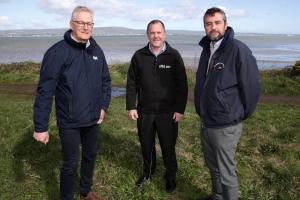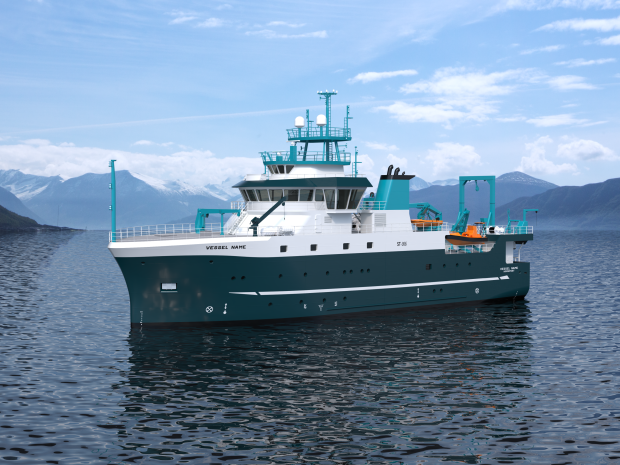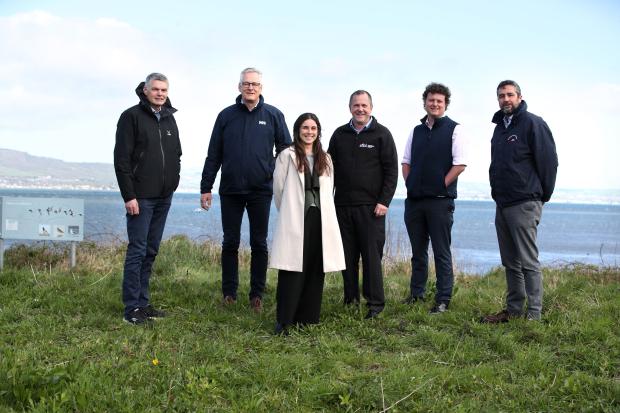AFBI makes major announcement on the building of a new research vessel for Northern Ireland
Date published:
The Agri-Food and Biosciences Institute today announced that a contract has been awarded to Spanish shipyard Astilleros Armon Vigo S.A. for the construction of a new research vessel contracted to complete in February 2027.

The state-of-the-art marine research vessel is a significant capital investment by the Department of Agriculture, Environment and Rural Affairs (DAERA) to strengthen and support marine science in Northern Ireland for the next 30 years. The announcement is a major milestone, following a detailed design phase by internationally leading Norwegain naval architects, Skipsteknisk AS.
The new 52.8 m vessel will replace AFBI’s current 35-year-old research vessel RV Corystes, operating out of the Port of Belfast, which is reaching the end of its working life. The replacement vessel will be able to spend 21 days at sea and be operational at sea for 300 days a year; therefore, allowing AFBI to continue and enhance its integrated marine science programme in Northern Ireland’s coastal waters, the Irish Sea and adjacent waters.

The vessel is designed to incorporate sustainability principles to ensure that it operates as efficiently as possible. It will be the first hybrid vessel within the regional research vessel fleet operating from the UK and Ireland, with sufficient battery capacity to allow some operational activities to be conducted on battery power alone. It will also be equipped to operate on biofuel, supporting the pathway to net zero.
Dr Stanley McDowell, AFBI CEO, welcomed the signing of the vessel build contract and stated: “The new research vessel will form a critical part of the Institutes science infrastructure. It will greatly enhance AFBI’s marine environmental and fisheries research capabilities in support of government policy, researchers, our coastal communities and the public. The work which will be undertaken on the new vessel is essential for the sustainable management of our marine ecosystems and natural resources, biodiversity, and future Climate Action Plans”.

“The coast of Northern Ireland, and seas around it, supports an exceptional diversity of marine wildlife and their habitats. The ocean also drives our weather and impacts us all, especially living on an island. When complete, our new multipurpose research vessel will incorporate the latest technologies providing a versatile platform from which a wide range of marine environmental and fisheries research can be undertaken including fisheries surveys, environmental change monitoring, seabed mapping and research on ocean processes. All of which is integral to improve our knowledge and helping scientists understand the impact of the ever-changing marine environment and rising sea levels. Crucially, the new vessel will allow for effective international collaboration and will take AFBI’s state-of-the-art research into the future.”
Notes to editors:
The contract was awarded after an extensive open tender process managed by Construction Procurement Delivery (CPD),Astilleros Armon shipyard, Spain, has a reputation as a builder of highly advanced vessels, with more than 800 ships built and in service throughout the world’s oceans. The yard recently built the RV Tom Crean, a 53 m research vessel delivered to the Marine Institute Ireland and the RV Kahoroa II, a 36 m research vessel delivered to the New Zealand National Institute of Water and Atmospheric Research (NIWA).The project objective is to deliver high quality research vessel based marine science survey capability in a changing high technology environment over a significant period of up to 30 years, with the construction of a new vessel evaluated as the best value for money option. This shipyard construction contract constitutes the capital investment component of the 30-year project.AFBI’s Vision is “Scientific excellence delivering impactful and sustainable outcomes for society, economy and the natural environment”. AFBI’s Purpose is “To deliver trusted, independent research, statutory and surveillance science and expert advice that addresses local and global challenges, informs government policy and industry decision making, and underpins a sustainable agri-food industry and the natural and marine environments”.AFBI’s core areas:Leading improvements in the agri-food industry to enhance its sustainability.Protecting animal, plant and human health.Enhancing the natural and marine environment.